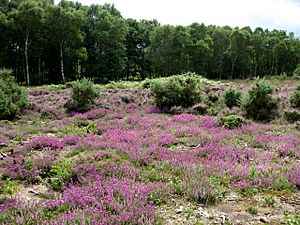Buxton Heath facts for kids
| Site of Special Scientific Interest | |
 |
|
| Area of Search | Norfolk |
|---|---|
| Interest | Biological |
| Area | 67.3 hectares (166 acres) |
| Notification | 1986 |
| Location map | Magic Map |
Buxton Heath is a very special natural area located north of Norwich in Norfolk, England. It covers about 67.3-hectare (166-acre), which is roughly the size of 166 football fields! This heath is super important for its amazing wildlife and unique natural features.
Because it's so special, Buxton Heath has been given a few important titles to help protect it. It's a Site of Special Scientific Interest (SSSI), which means it has rare plants, animals, or geological features. It's also a Nature Conservation Review site (Grade 2) and part of a larger area called the North Valley Fens Special Area of Conservation. All these titles show just how valuable Buxton Heath is for nature!
Contents
What Makes Buxton Heath Special?
Buxton Heath is a fascinating place because it has two very different types of natural environments.
A Mix of Dry and Wet Lands
The heath has areas of dry, sandy land. These parts are called "acidic heath" because the soil is a bit acidic and sandy, which is perfect for certain types of plants. These sandy areas were formed by glaciers a very long time ago.
However, the most interesting part of Buxton Heath is its wet areas. Along the valley of a small stream, you'll find a "mire." A mire is a type of wetland, like a bog or a swamp, where the ground is always wet and squishy. These wet areas are incredibly important for nature.
Home to Rare Species
The mire at Buxton Heath is a real treasure chest of rare and unusual living things.
Tiny Plants and Fungi
You can find many rare types of mosses and liverworts here. These are small, simple plants that love damp places. There are also some very uncommon fungi. These species are often "relict," meaning they are leftovers from a time when these habitats were more common.
Unique Insects and Bugs
The wet areas are also home to some very rare invertebrates. Invertebrates are animals without backbones, like insects, spiders, and worms. Scientists have even found one species of invertebrate at Buxton Heath that had never been seen in Britain before! This shows how unique and important this habitat is for discovering new wildlife.
Who Looks After Buxton Heath?
Keeping Buxton Heath healthy and special requires a lot of care. The heath is managed by a group called the Buxton Heath Wildlife Group. They work hard to protect the different habitats and the rare species that live there, making sure this amazing natural space can thrive for years to come.

